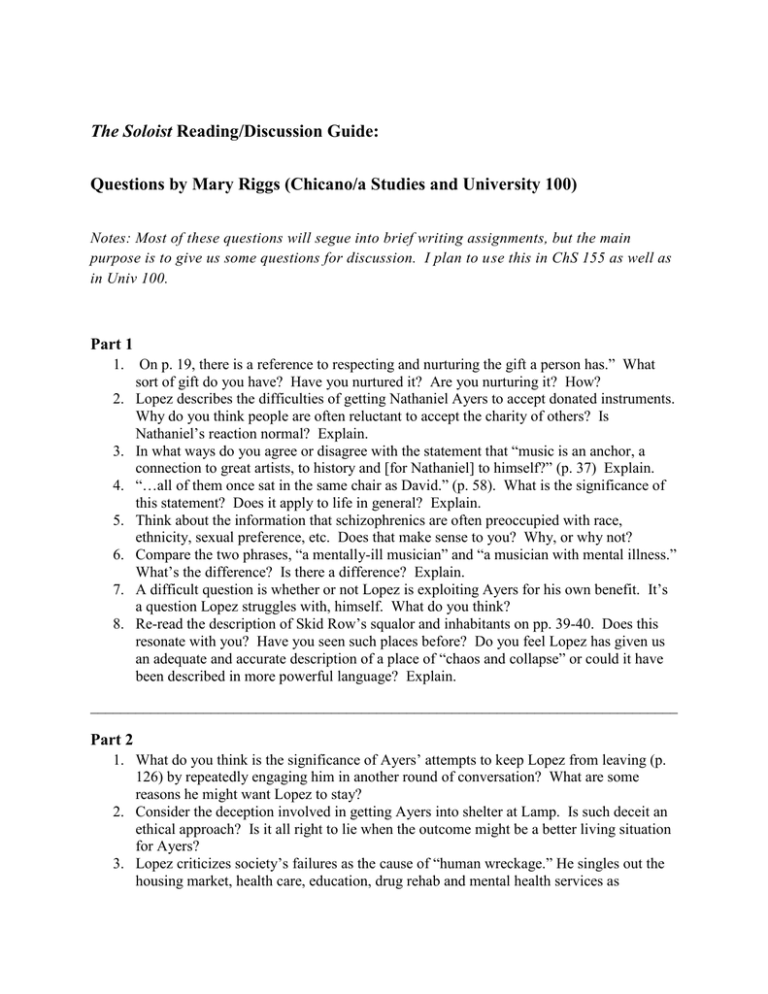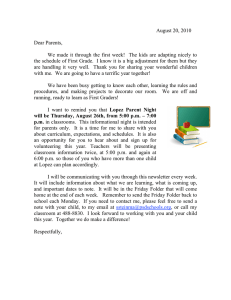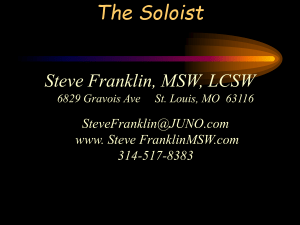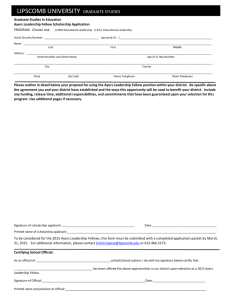The Soloist Questions by Mary Riggs (Chicano/a Studies and University 100)
advertisement

The Soloist Reading/Discussion Guide: Questions by Mary Riggs (Chicano/a Studies and University 100) Notes: Most of these questions will segue into brief writing assignments, but the main purpose is to give us some questions for discussion. I plan to use this in ChS 155 as well as in Univ 100. Part 1 1. On p. 19, there is a reference to respecting and nurturing the gift a person has.” What sort of gift do you have? Have you nurtured it? Are you nurturing it? How? 2. Lopez describes the difficulties of getting Nathaniel Ayers to accept donated instruments. Why do you think people are often reluctant to accept the charity of others? Is Nathaniel’s reaction normal? Explain. 3. In what ways do you agree or disagree with the statement that “music is an anchor, a connection to great artists, to history and [for Nathaniel] to himself?” (p. 37) Explain. 4. “…all of them once sat in the same chair as David.” (p. 58). What is the significance of this statement? Does it apply to life in general? Explain. 5. Think about the information that schizophrenics are often preoccupied with race, ethnicity, sexual preference, etc. Does that make sense to you? Why, or why not? 6. Compare the two phrases, “a mentally-ill musician” and “a musician with mental illness.” What’s the difference? Is there a difference? Explain. 7. A difficult question is whether or not Lopez is exploiting Ayers for his own benefit. It’s a question Lopez struggles with, himself. What do you think? 8. Re-read the description of Skid Row’s squalor and inhabitants on pp. 39-40. Does this resonate with you? Have you seen such places before? Do you feel Lopez has given us an adequate and accurate description of a place of “chaos and collapse” or could it have been described in more powerful language? Explain. ______________________________________________________________________________ Part 2 1. What do you think is the significance of Ayers’ attempts to keep Lopez from leaving (p. 126) by repeatedly engaging him in another round of conversation? What are some reasons he might want Lopez to stay? 2. Consider the deception involved in getting Ayers into shelter at Lamp. Is such deceit an ethical approach? Is it all right to lie when the outcome might be a better living situation for Ayers? 3. Lopez criticizes society’s failures as the cause of “human wreckage.” He singles out the housing market, health care, education, drug rehab and mental health services as 4. 5. 6. 7. particularly “obscene” and “shameful.” Do you consider these terms too strong, about right, or not strong enough? Explain. Lopez argues that “there’s little political advantage” to cleaning up Skid Row unless the problem is featured in the media. Do you think that attitude is too cynical? Why, or why not? The fact that Ayers will “probably never be happy” on Lopez’ terms is something the columnist ponders when Ayers argues he can’t survive if he can’t hear the orchestra the way he likes to hear it. Why do you think so-called “normal” people often settle for less than they really want? Or do we? Do we complain enough? How do we deal with people whose behavior is a disappointment to us, when we think we know what they need, as Lopez is disappointed (p. 194) when Adams, after a brutal beating, chooses to be released back out on the street? Does society have the authority or the responsibility to do the right thing, or should people who are not mentally healthy be able to make their own decisions? Explain. Consider the idea that what Lopez is doing is not “just journalistic calculation, but a matter of curiosity and a desire for meaning.”(p. 196) What does that tell us about human nature? ________________________________________________________________________ Part 3 1. Analyze the following statements (pp. 210-211) in terms of your own experiences and beliefs: Relationship is primary It is possible to cause seemingly biochemical changes through human emotional involvement Friendship is too much about the past Friendship is easier when it has no history, no time for broken promises and all the little piques that fill a running tally sheet …a friend is someone who inspires, who challenges, who sends you in search of some truer sense of yourself Do any of these make sense to you? Which one(s), in particular, and why, or why not? 2. Lopez writes that when we have “expectations that are unrealistic….ego is involved.” (p. 226) How does that relate to his frustrations with Ayers? Does it also apply in our relationships with friends and family, or our expectations of ourselves? Explain. 3. How does Lopez reconcile Ayers’ apparent racism towards other people (p. 227) with their own relationship? Think back to instances when Lopez realizes that he may have inadvertently treated Ayers with less respect because of his disabling condition, when Nathaniel reacts against behavior that he considers degrading or demeaning to himself. Is this the schizophrenia at work, or something else? 4. Do you believe Lopez has really exploited Ayers? (p. 230-232) Explain your thinking. 5. Ayers says that “it’s more interesting to be out in the world than to see it reflected in the mirror.” (p. 255) Does this seem to be a kind of criticism of himself or of human beings in general? Why do you think he feels that way? 6. Lopez hits a low point when Ayers, despite all his progress, blows up at him and seems to sever the relationship. (chapter 27) How does Lopez recover from this devastating rupture? What does Ayers do on their next meeting which seems incredible, given the blow-up? What might we learn from this episode about mental illness? 7. What are some ways we can interpret Ayers’ statement (p.286) that he doesn’t “want the concert to ever end” as The Soloist closes? Do you feel optimistic or pessimistic about the message of the book? Explain. Riggs 8/09



